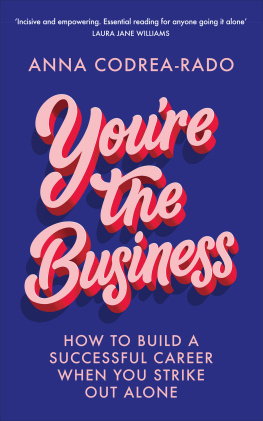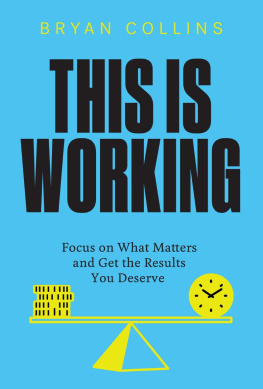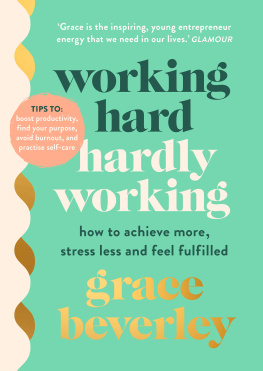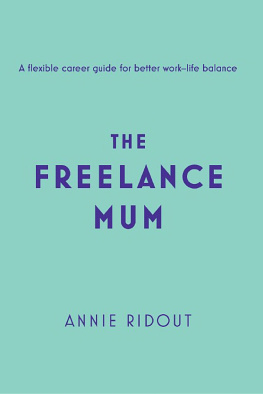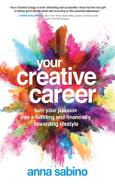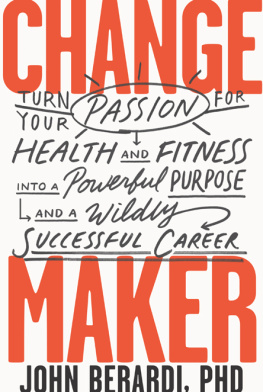Anna Codrea-Rado
Youre the Business
How to Build a Successful Career When You Strike Out Alone

Contents
About the Author
Anna Codrea-Rado is a journalist, podcaster and campaigner.
Her writing appears in the New York Times, Guardian, Wired, Monocle and many others. As a campaigner for freelance workers rights, she launched the #FairPayForFreelancers campaign and the Freelancer Pay Gap tracker. Shes also the co-host of the number one careers podcast, Is This Working?, alongside the writer Tiffany Philippou.
In 2017, when she first went freelance, Anna started a newsletter about her experience of losing a job and striking out on her own. LANCE has since grown into a weekly staple for tens of thousands of readers, who turn to it for its candid advice on how to be happy and successful working for themselves.
Youre the Business is her first book.
For anyone who ever dreamed that maybe things could be better if they just lived life on their own terms

Part One
Freelancing Fundamentals
CHAPTER ONE
Setting Up
On an unremarkable Friday afternoon in the summer of 2017, I lost my job.
I was called into a meeting room at work and my bosss boss Skyped me from the New York headquarters to let me know that I was being made redundant. The website Id worked for as an editor for the previous two years was being shut down and nearly all its staff were being let go, effective immediately. In a state of shock, I packed up my desk, left the office in the middle of the afternoon and went home.
Over the weekend, my mum took me out for lunch to console me. She was telling me everything would be fine and that Id find a new job soon when I heard the words come out of my mouth: Ive already got another job. Im freelance now. Sure enough, when Monday morning rolled around, I got up and went into the kitchen where I sat at the table, opened up my laptop and started freelancing.
In the year before I lost my job, Id already thought about going it alone. I would sit at my desk in the windowless basement at my staff job and daydream about what it would be like to make a living from my own home. Not having to deal with the politics of an office, or indeed the commute to it, sounded like my kind of career. It wasnt just my allergy to the office that made me suspect I was better suited for self-employment as someone who thrives on variety and who struggles with being told what to do within a rigid professional hierarchy, Ive always felt hemmed in by any job title Ive held.
But it took a redundancy to finally push me to make the leap. Id been too scared to go freelance up until then because Id heard the horror stories about how precarious self-employment was and I believed them. I was worried that I wouldnt be able to make the finances work, that I wouldnt find any clients, that Id drown under a pile of crumpled receipts trying to file my own tax returns.
What I realise now is that I was telling myself freelancing wasnt viable because I refused to believe that it was possible to have my dream career come true. I was hiding behind excuses of a regular pay cheque, holiday and sick pay, and staying in a job that made me miserable. But when all the things I thought I had to lose were gone, I realised it was time to make a change. In spite of the circumstances that prompted the start of my freelancing, by the first anniversary of my redundancy Id had the best year of my career. I was writing for publications Id once only dreamed of, including a front-page story in the New York Times. I was earning more than I had done in my staff job. And, most importantly, Id never felt more fulfilled in all of my working life.
The horror stories didnt materialise but I did have to adjust to freelance life, which opened my eyes to a completely different way of working than I was used to in traditional employment. When I started my very first job, I was shown around the office, my new colleagues took me for lunch and the HR worker handed me an employee handbook. None of that happened when I went freelance. No one showed me how to go about doing my work, no one invited me out for lunch and there was no handbook to reference. I was on my own.
Freelancing isnt better than working in-house, nor is freelancing a solution to work-based problems. My own story isnt about quitting a job, going freelance and living happily ever after. Its about figuring out how to make working for myself work for the long haul, because I truly believe that it can be a viable career plan for those who choose to work differently. When I look back over the course of my freelancing career to date, theres so much I wish Id known. I needed a resource to guide me through the ups and downs, a handbook I could keep on my desk and reference whenever something unexpected came up.
So, I wrote it all down. I wrote Youre the Business to be your own personal freelance cheerleader. Ive filled it with everything you need to know to work for yourself, including all the lessons Ive learned and some inspiration from a few superstar freelancers. I hope this book can be something you turn to when you have a problem that needs solving, that it brings you comfort when times are hard and, ultimately, that it gives you a roadmap for happiness and success when you strike out alone.
In this chapter, youll learn:
- What working for yourself means
- Your rights when youre a freelancer
- The difference between a sole trader and limited company
What Does Working for Yourself Actually Mean?
As I was about to start writing this book, I was procrastinating under the thinly veiled guise of spring cleaning my office. While sorting through an old box, I found a notebook Id bought in 2016 when I was still in a staff role and plotting out my dream of self-employment. I opened the notebook and on the first page Id written Why I want to go freelance across the top. The first point Id noted down was A greater sense of self-worth from doing something completely independently. Id also written that I wanted more autonomy over my time, greater flexibility in my career and to be proud of myself for trying new things.
Reading over that list, I was taken straight back to a time when I was unfulfilled in my professional life and imagining what working for myself might be like. I remembered writing it and a little voice in the back of my mind telling me that it couldnt possibly be as good as I was dreaming. And yet, on reflection, it has been.
Finding that list got me thinking about what we actually mean when we say we work for ourselves. For me, being freelance means a lot more than just an employment status. Working for myself means living life on my own terms its a life choice as much as it is a job. In working for myself, Ive learned as much, if not more, about who I am as a person as I have about business. For instance, Ive realised that I am enthused by helping other people solve a problem. Ive also learned hard lessons, like how I tangle up what I do for work with too much of my identity. Knowing myself better what motivates me and what Im passionate about has helped me create a more fulfilling career.

